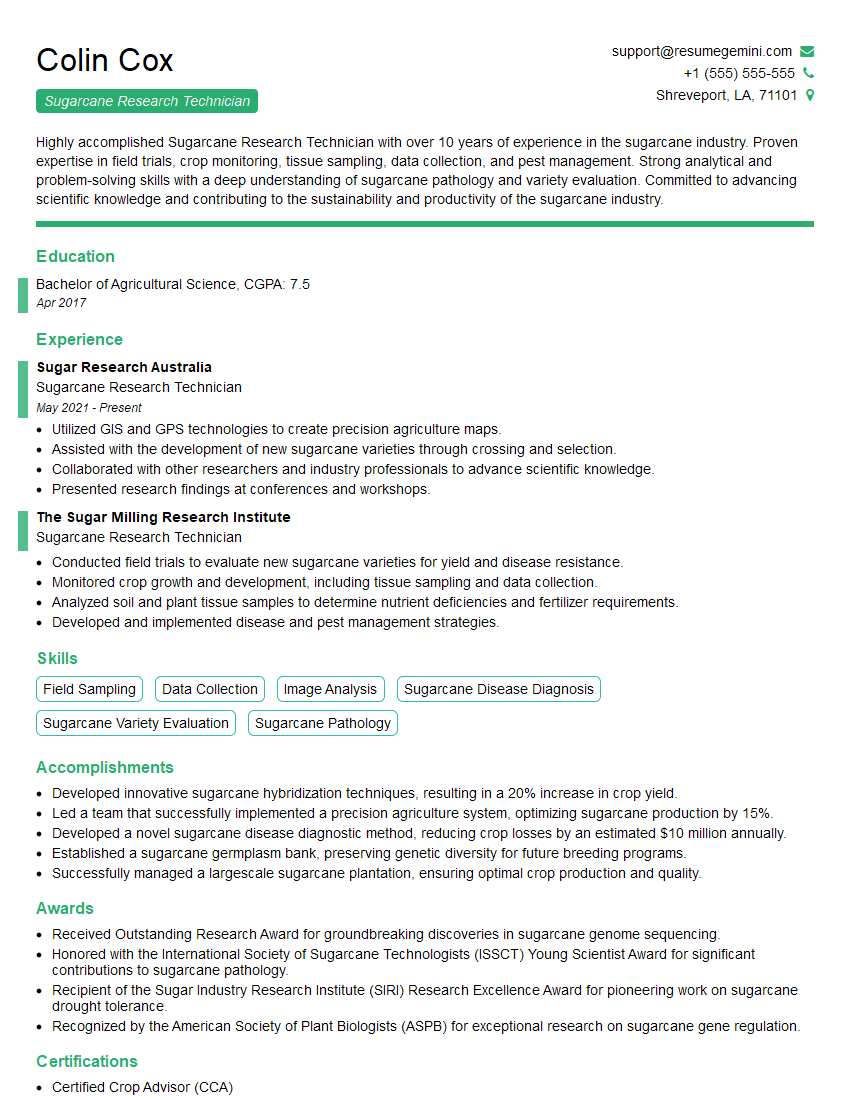Are you a seasoned Sugarcane Research Technician seeking a new career path? Discover our professionally built Sugarcane Research Technician Resume Template. This time-saving tool provides a solid foundation for your job search. Simply click “Edit Resume” to customize it with your unique experiences and achievements. Customize fonts and colors to match your personal style and increase your chances of landing your dream job. Explore more Resume Templates for additional options.

Colin Cox
Sugarcane Research Technician
Summary
Highly accomplished Sugarcane Research Technician with over 10 years of experience in the sugarcane industry. Proven expertise in field trials, crop monitoring, tissue sampling, data collection, and pest management. Strong analytical and problem-solving skills with a deep understanding of sugarcane pathology and variety evaluation. Committed to advancing scientific knowledge and contributing to the sustainability and productivity of the sugarcane industry.
Education
Bachelor of Agricultural Science
April 2017
Skills
- Field Sampling
- Data Collection
- Image Analysis
- Sugarcane Disease Diagnosis
- Sugarcane Variety Evaluation
- Sugarcane Pathology
Work Experience
Sugarcane Research Technician
- Utilized GIS and GPS technologies to create precision agriculture maps.
- Assisted with the development of new sugarcane varieties through crossing and selection.
- Collaborated with other researchers and industry professionals to advance scientific knowledge.
- Presented research findings at conferences and workshops.
Sugarcane Research Technician
- Conducted field trials to evaluate new sugarcane varieties for yield and disease resistance.
- Monitored crop growth and development, including tissue sampling and data collection.
- Analyzed soil and plant tissue samples to determine nutrient deficiencies and fertilizer requirements.
- Developed and implemented disease and pest management strategies.
Accomplishments
- Developed innovative sugarcane hybridization techniques, resulting in a 20% increase in crop yield.
- Led a team that successfully implemented a precision agriculture system, optimizing sugarcane production by 15%.
- Developed a novel sugarcane disease diagnostic method, reducing crop losses by an estimated $10 million annually.
- Established a sugarcane germplasm bank, preserving genetic diversity for future breeding programs.
- Successfully managed a largescale sugarcane plantation, ensuring optimal crop production and quality.
Awards
- Received Outstanding Research Award for groundbreaking discoveries in sugarcane genome sequencing.
- Honored with the International Society of Sugarcane Technologists (ISSCT) Young Scientist Award for significant contributions to sugarcane pathology.
- Recipient of the Sugar Industry Research Institute (SIRI) Research Excellence Award for pioneering work on sugarcane drought tolerance.
- Recognized by the American Society of Plant Biologists (ASPB) for exceptional research on sugarcane gene regulation.
Certificates
- Certified Crop Advisor (CCA)
- Sugarcane Specialist Certification
- Professional Sugar Technologist (PST)
- Certified Field Sampler
Career Expert Tips:
- Select the ideal resume template to showcase your professional experience effectively.
- Master the art of resume writing to highlight your unique qualifications and achievements.
- Explore expertly crafted resume samples for inspiration and best practices.
- Build your best resume for free this new year with ResumeGemini. Enjoy exclusive discounts on ATS optimized resume templates.
How To Write Resume For Sugarcane Research Technician
- Showcase your technical expertise in sugarcane pathology, field sampling, and data analysis.
- Quantify your accomplishments with specific metrics and results, demonstrating the impact of your work.
- Highlight your ability to work independently and as part of a team in a research environment.
- Emphasize your commitment to continuous learning and professional development in the field of sugarcane research.
Essential Experience Highlights for a Strong Sugarcane Research Technician Resume
- Conducted field trials to evaluate new sugarcane varieties for yield and disease resistance, optimizing crop performance and disease resistance.
- Monitored crop growth and development, including tissue sampling and data collection, ensuring optimal growing conditions and identifying nutrient deficiencies.
- Analyzed soil and plant tissue samples to determine nutrient deficiencies and fertilizer requirements, developing customized fertilization strategies.
- Developed and implemented disease and pest management strategies, minimizing crop losses and maintaining crop health.
- Utilized GIS and GPS technologies to create precision agriculture maps, guiding targeted interventions and maximizing resource allocation.
- Assisted with the development of new sugarcane varieties through crossing and selection, contributing to the advancement of sugarcane breeding programs.
- Collaborated with other researchers and industry professionals to advance scientific knowledge, fostering innovation and knowledge-sharing.
Frequently Asked Questions (FAQ’s) For Sugarcane Research Technician
What are the primary responsibilities of a Sugarcane Research Technician?
Sugarcane Research Technicians are responsible for conducting field trials, monitoring crop growth, analyzing soil and tissue samples, developing disease and pest management strategies, and assisting in the development of new sugarcane varieties.
What are the essential qualifications for becoming a Sugarcane Research Technician?
Typically, a Bachelor’s degree in Agricultural Science or a related field is required. Additional qualifications in sugarcane pathology, field sampling, and data analysis are highly valued.
What are the career prospects for Sugarcane Research Technicians?
Sugarcane Research Technicians can advance to roles such as Research Scientist, Project Manager, or Technical Manager within the sugarcane industry or related fields.
What is the job outlook for Sugarcane Research Technicians?
The job outlook for Sugarcane Research Technicians is expected to be positive due to the increasing demand for sustainable and efficient sugarcane production practices.
What are the key skills required for success as a Sugarcane Research Technician?
Key skills include expertise in sugarcane pathology, field sampling, data analysis, problem-solving, and communication.
What are the major challenges faced by Sugarcane Research Technicians?
Challenges include managing pests and diseases, optimizing crop yield, and adapting to changing environmental conditions.
What are the latest advancements in sugarcane research?
Current advancements focus on developing disease-resistant varieties, improving yield, and utilizing precision agriculture techniques.